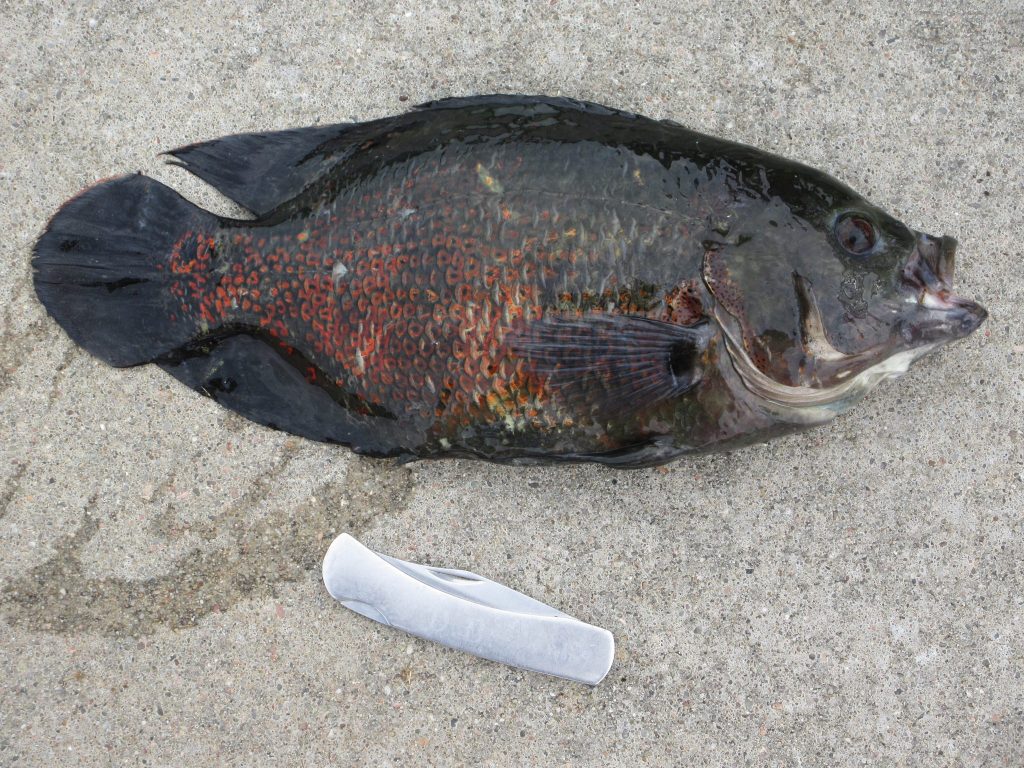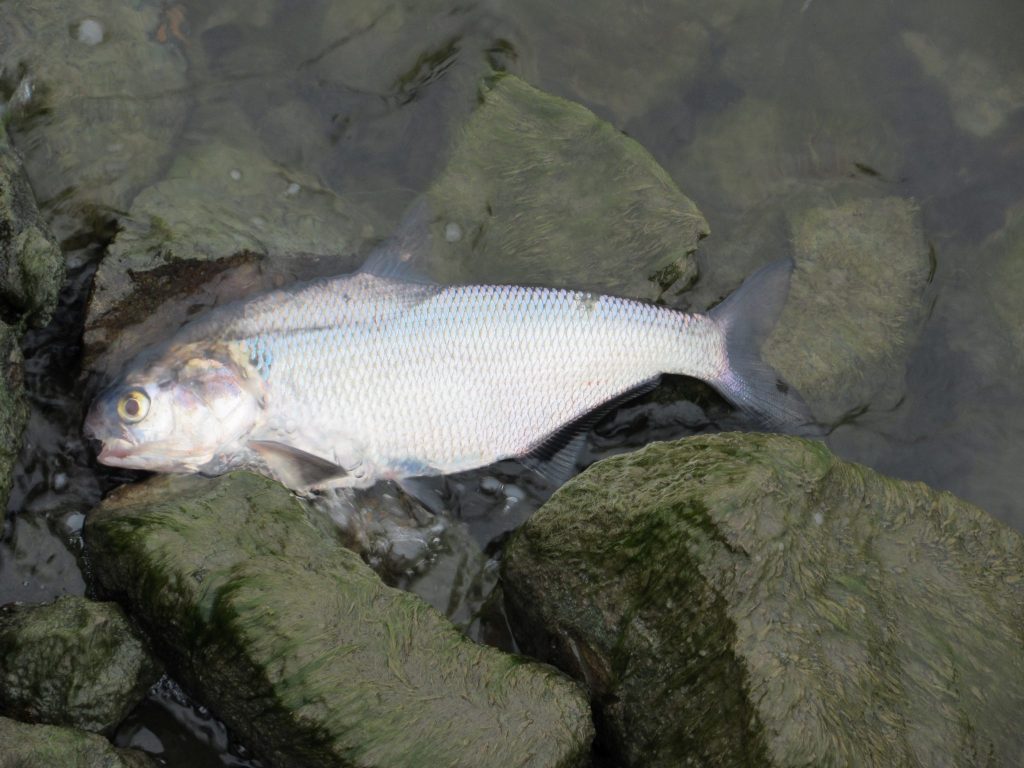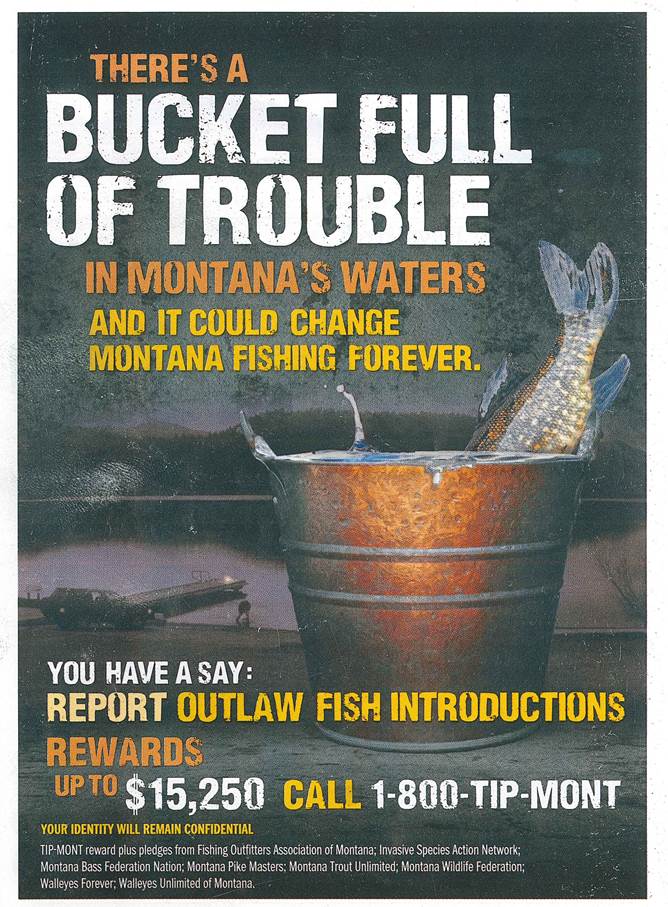It was late afternoon, the day was winding down; my phone rang. I answered and listened as an angler at nearby Bowling Lake described a fish he had just caught and laid in the grass; something he had never seen before. Identifying fish over the phone is always a challenge, but in this case I had an idea what he had caught. I asked him if he would be there for a few more minutes, I was on my way.
I found the gentleman and another angler chatting in the parking lot when I pulled in. They were discussing the alien fish that had been caught. Here is what they were standing over:
That fish was was pulled out of Bowling Lake alright, but it was not a species that has ever been part of Nebraska’s freshwater fauna, never been a part of North America’s freshwater fauna. Some of you will recognize it as an Oscar. An Oscar, a freshwater fish native to the Amazon basin of South America. How does an Oscar end up swimming in Bowling Lake? I can answer that: Oscars can be possessed and kept in aquaria. Unfortunately, irresponsible aquarium owners take their unwanted fish and release them in local waters. This ain’t the first time Oscars, pacu, tilapia, plecostomus, redtail catfish, or even piranha have shown up in Nebraska waters (Aliens).
I asked the gentleman who landed the Oscar, on a jig if I recall, if he wanted to take it home and fry it up? He declined.
I took Oscar and sent him on a winter retreat. I am a huge proponent of catch & release, but I can tell you for sure that fish was NOT going back in the water.
Admittedly, the risk from having tropical, aquarium fish released in our waters is minimal, because they likely will go belly-up as soon as our water temperatures start dropping in late fall. Thank goodness. However, this occurrence again points out one of the biggest threats to our fisheries across the country and in Nebraska–illegal releases of undesirables species of fish. I blogged recently about an incident at Calamus Reservoir where there was a risk of zebra mussels being illegally transported there (What Keeps Fisheries Biologists Awake at Night); the risk to our waters, to our fisheries, to our fishing, is no less from the transport of unwanted fish!
What is an unwanted species of fish? That depends on where you are and the species in question. As a matter of fact, a species such as gizzard shad may be a welcome member of one waterbody’s fish community while it is “the kiss of death” to another. In some cases even sportfish like largemouth and smallmouth bass, northern pike, and even walleye may be invasive, unwanted species! Yes, “it depends”, and the appropriateness of one species or another depends on the habitat and fisheries management objectives–decisions best left in the hands of trained resource professionals, biologists, and not with some “know-it-all” carrying a bucket.
Recently, I saw this headline, another example, Gizzard Shad found in Iowa Great Lakes. Now, I am a Nebraska fisheries biologist and know very little about Iowa, but I do know this, gizzard shad are not native to those natural lakes in Iowa and they are not welcome in those waters. They will be a threat to the fish community and fishing there, “Gizzard shad are known to disrupt fisheries and compete with native fish like bluegill and yellow perch.”
How did they get there? “It is possible that someone intentionally put them in the lake.” an Iowa fisheries biologist was quoted as saying.
I am betting he is right, in fact, I saw this reaction on a bass fishing blog:

Don’t believe this is a serious problem?
If you read my blog, you know I just recently returned from a trip to Montana. Here is what the back page of the 2017 Montana Fishing Guide looks like:
Read the fine print at the bottom, read it close. Notice that it was not just some “stupid” government regulation, notice the support from a number of conservation organizations, even pike and walleye organizations!
This is a major threat to fisheries all across our country!
No, unwanted species are not getting moved around by birds, butterflies, or sasquatch, they are being moved by two-legged human violators and they need to be stopped. A quote from the 2017 Montana Fishing Guide sums it up, “Illegal introductions are made without proper biological analysis and public input meaning that you the angler had no say in an ill-informed action by self-serving individuals.”
The cavalier attitude of some anglers about this issue tells me that fish being illegally moved around is not just accidental or unintentional. It suggest to me that it is far more sinister than that, that there are violators out there who are knowingly, intentionally sabotaging our fisheries resources. I am afraid there are more of those criminals out there than you might expect.
I do not like that one bit. Those fisheries belong to all of us, they belong to you, they belong to me, and I take the health of those fisheries and the quality of my fishing very seriously.
By the way, do not even think of dumping your minnow bucket in the lake when you are finished fishing. I have seen that illegal act done frequently too.
I started this blog post with a phone call, let me finish it with a text I got over the weekend. On another urban water, an angler observed a couple of violators illegally netting fish, throwing them in buckets, and then shuttling the buckets to waiting vehicles. He took some pictures and made the call, Nebraska Wildlife Crimestoppers, 1-800-742-7627. There was a conservation officer nearby and he got there as soon as possible, literally minutes after the violators had gone. Unfortunately, they escaped before license plates could be observed. What fish they illegally captured, and which waters those fish were destined for, I can only guess.
Looks like another sleepless night.
A fish pox on all bucket biologists!
The post Undesirables appeared first on NEBRASKALand Magazine.

















